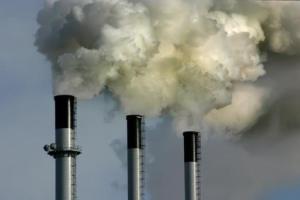
Global Carbon Emissions Reach Record
10 Billion Tons, Threatening 2 Degree Target
Dec. 4, 2011 - sciencedaily.com
 |
| New research finds that global carbon dioxide emissions from burning fossil fuels have increased by 49 percent in the last two decades. (Credit: © Snap Happy / Fotolia) |
“ScienceDaily (Dec. 4, 2011) — Global
carbon dioxide emissions from burning fossil
fuels have increased by 49 per cent in the last
two decades, according to the latest figures
by an international team, including researchers
at the Tyndall Centre for Climate Change Research,
University of East Anglia.
Published Dec. 4 in the journal Nature Climate
Change, the new analysis by the Global Carbon Project
shows fossil fuel emissions increased by 5.9 per
cent in 2010 and by 49 per cent since 1990 -- the
reference year for the Kyoto protocol.
On average, fossil fuel emissions have risen by
3.1 per cent each year between 2000 and 2010 --
three times the rate of increase during the 1990s.
They are projected to continue to increase by 3.1
per cent in 2011.
Total emissions -- which combine fossil fuel combustion,
cement production, deforestation and other land
use emissions -- reached 10 billion tonnes of carbon*
in 2010 for the first time. Half of the emissions
remained in the atmosphere, where CO2 concentration
reached 389.6 parts per million. The remaining
emissions were taken up by the ocean and land reservoirs,
in approximately equal proportions.
Rebounding from the global financial crisis of
2008-09 when emissions temporarily decreased, last
year's high growth was caused by both emerging
and developed economies. Rich countries continued
to outsource part of their emissions to emerging
economies through international trade.
Contributions to global emissions growth in 2010
were largest from China, the United States, India,
the Russian Federation and the European Union.
Emissions from the trade of goods and services
produced in emerging economies but consumed in
the West increased from 2.5 per cent of the share
of rich countries in 1990 to 16 per cent in 2010.
In the UK, fossil fuel CO2 emissions grew 3.8 per
cent in 2010 but were 14 per cent below their 1990
levels. However, emissions from the trade of goods
and services grew from 5 per cent of the emissions
produced locally in 1990 to 46 per cent in 2010
-- overcompensating the reductions in local emissions.
Emissions in the UK were 20 per cent above their
1990 levels when emissions from trade are taken
into account.
"
Global CO2 emissions since 2000 are tracking the
high end of the projections used by the Intergovernmental
Panel on Climate Change, which far exceed two degrees
warming by 2100," said co-author Prof Corinne
Le Quéré, director of the Tyndall
Centre for Climate Change Research and professor
at the University of East Anglia. "Yet governments
have pledged to keep warming below two degrees
to avoid the most dangerous aspects of climate
change such as widespread water stress and sea
level rise, and increases in extreme climatic events.
"
Taking action to reverse current trends is urgent."
Lead author Dr Glen Peters, of the Centre for International
Climate and Environmental Research in Norway, said: "Many
saw the global financial crisis as an opportunity
to move the global economy away from persistent
and high emissions growth, but the return to emissions
growth in 2010 suggests the opportunity was not
exploited."
Co-author Dr Pep Canadell, executive director of
the Global Carbon Project, added: "The global
financial crisis has helped developed countries
meet their production emission commitments as promised
in the Kyoto Protocol and Copenhagen Accord, but
its impact has been short-lived and pre-existing
challenges remain."
* Values reported here are in billion tonnes of
carbon. To convert emissions to billion tonnes
of CO2, multiply the value by 3.67.

|



